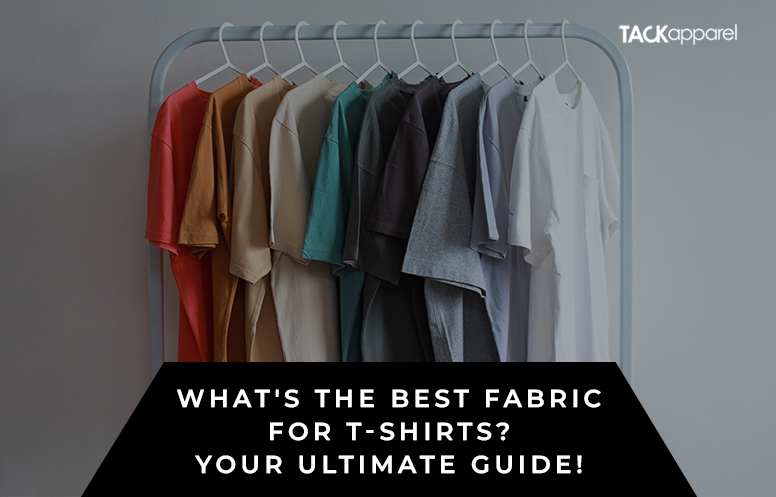Have you ever wondered what makes the perfect T-shirt? It all boils down to the suitable material! The fabric choice can significantly affect how your T-shirt feels, performs, and looks. Options range from the softest cotton to the most sweat-wicking synthetics. In this guide, we’ll look into the various materials for T-shirts, helping you pick the perfect one for your needs. Whether you’re a t-shirt lover or a t-shirts manufacturer, this guide will give you the information to choose the best material for your T-shirts.
Understanding Fabric Properties
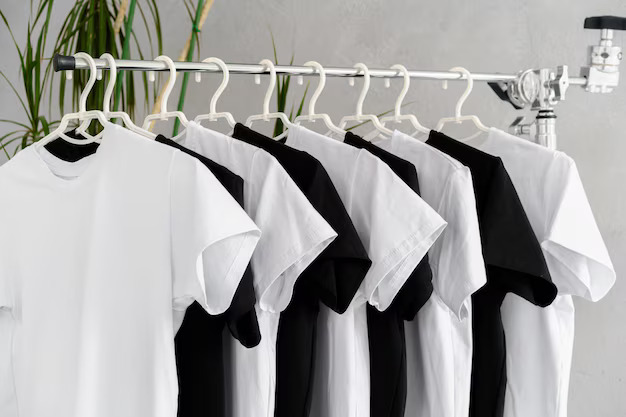
Making an intelligent choice regarding t-shirt fabric selection requires knowing the essential characteristics. Below is a summary of several essential fabric characteristics and how they affect the wearer’s experience:
Breathability
This is a reference to the fabric’s capacity to let air, keeping the wearer cozy and cool. Because they breathe a great deal, shirt materials like cotton and linen are great for hot weather or strenuous physical activity.
Moisture-Wicking
Moisture-wicking fabrics soak away perspiration from the skin to keep the wearer dry and comfortable. Synthetic textiles that excel in wicking away moisture include polyester and blends containing spandex.
Softness
The comfort of a fabric against the skin is influenced by its softness. Cotton material for shirts is common because of its well-known softness. Additionally providing a luxuriant softness that improves the wearer’s comfort are modal and bamboo textiles.
Durability
Repeated washings and wearings of a durable cloth prevent it from losing its original form or shape. Because of the additional strength and elasticity, cotton blends—especially those including polyester or elastane—tend to be more durable than pure cotton.
Wrinkle Resistance
The wrinkle-resistant fabric of t-shirt looks tidy and professional after heavy use or storage. Excellent wrinkle resistance is a feature of synthetic fibers like polyester and mixes with elastane, which makes them ideal for travel and daily wear.
Ease Of Care
While certain textiles are more low-maintenance, others need specific care guidelines, such as dry cleaning or gentle washing. Cotton is a practical material for daily t-shirts because it is often easy to maintain and can tolerate frequent machine washing.
Most Popular T-Shirt Materials
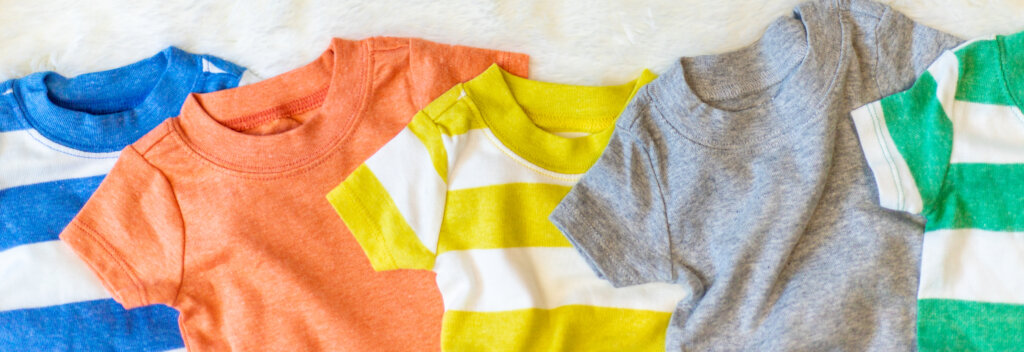
What materials are used to make t-shirts? A T-shirt is a wardrobe fundamental that everyone should have. They are suitable for almost any occasion, including nights out and the gym. There are countless fits, colors, and materials of t-shirts. The 6 best fabric for t-shirt are listed here, so check them out based on your needs.
100% Cotton
Nowadays, cotton shirts are the most widely used material on the market. They effectively absorb sweat and moisture and are soft, comfy, and reasonably priced. Because cotton is soft and comforting against the skin, it is a favorite textile among consumers.
Because of this, they are the ideal T-shirts to wear in warm weather. Cotton is a lightweight fabric and isn’t very durable, though, it wrinkles easily. If cotton T-shirts are dried on a high heat setting, they may also shrink. Compared to T-shirts manufactured with blends of T-shirt materials, this material is less durable. Is cotton elastic? is a question posed by some. No, is the response. Cotton has a modest degree of flexibility.
Polyester
T-shirts made of polyester are resistant to chemicals, abrasion, shrinking, and wrinkles. They are also quite adaptable and may be used in a wide range of situations due to their outstanding color retention qualities.
Have you ever wondered how polyester feels? The best t-shirt material in terms of durability on the market right now is polyester. They are an excellent option for t-shirts that will be worn frequently because of their ability to resist wrinkles and retain color over time.
The sole drawback of polyester T-shirts is their inferior breathability compared to cotton material shirt due to their poor absorption of perspiration and moisture. In addition, their cost is higher than that of other T-shirt fabrics.
Cotton/Polyester Blends
Cotton Polyester Blend shirt material is a combination of natural cotton and (synthetic) polyester. It is sometimes referred to as Poly Cotton, Polycotton, or Poly-cotton. One of the most widely used shirting material fabric is polyester cotton.
They combine the durability and wrinkle resistance of polyester with nearly all the natural advantages of cotton. While 100% cotton will always be more breathable than polycotton, this types of fabric is also more adaptable and dries more quickly.
Cotton Elastane Blend Fabric
The fabric type that blends cotton with elastane is called cotton stretch or cotton elastane blend. Cotton and Elastane (also known as Lycra) Elastane fibers are synthetic and are never used by themselves to make fabric; instead, they are combined with other materials like cotton and polyester.
Compared to cotton t-shirt material mixes, cotton-elastane blend t-shirts are thinner. Its lightweight characteristic makes it ideal for outdoor activities when combined with other lightweight, breathable textiles. For this reason, this kind of fabric blend is more comfortable for sporting events and physical activities. About 95% cotton and 5% elastane should be the appropriate material mix.
Organic Cotton
Tees made of organic cotton come from farms that don’t use pesticides or herbicides on their cotton crops. Consequently, of all the t-shirts on the market right now, this natural t-shirt material has the least negative effect on the environment.
It is perfect for T-shirts worn in warm weather because it is soft and breathable. T-shirts made of organic cotton are more costly to make than ones made of standard 100% cotton, and if they are dried on high heat, they may shrink rapidly.
Silk T-shirts
Silk T-shirts feel good against the skin but don’t retain moisture or perspiration. T-shirts intended for indoor use during warm weather perform best when made of this material. Another common option for tuxedo shirts or t-shirts worn with formal wear is silk t-shirts.
The most opulent fabric on the market right now is this t-shirt cloth. Wearing it is quite comfy and silky. Silk t-shirts, however, can stretch out easily and are more costly.
Other T-shirt Material Options

There are a few more options available if you’re looking for something a little unusual. These options are usually more expensive than the previous three since they are less plentiful. However, they also have some special advantages, particularly if you’re going somewhere cold or need something to stay cool during a strenuous workout.
Recycled T-shirts
Recycled T-shirts are created from discarded T-shirts that are recycled by apparel producers. The most environmentally friendly T-shirt alternative on the market right now is made of this material. Recycled T-shirts, on the other hand, are a poor choice for T-shirts that must look crisp and clean because they fade and change color over time.
Bamboo
Because of its moisture-wicking and antibacterial properties, bamboo is a fabric for t shirts that is becoming more and more popular for T-shirts. These t-shirts are appropriate for running or working out. They can help lower the temperature and lessen the intensity of a sweltering summer day.
Viscose
Viscose, a kind of rayon, is made from pulped wood. It shares some characteristics with rayon, but because of its inherent moisture-wicking properties, it’s also comparable to bamboo in that it works well during exercise.
Hemp
Although hemp has been used for a long time, the trend of hemp clothing is only now starting to gain traction, and with good reason. Hemp not only feels incredibly good on the skin, but it reduces carbon dioxide emissions, protecting the environment.
Choosing the Best T-shirt Material for Your Needs
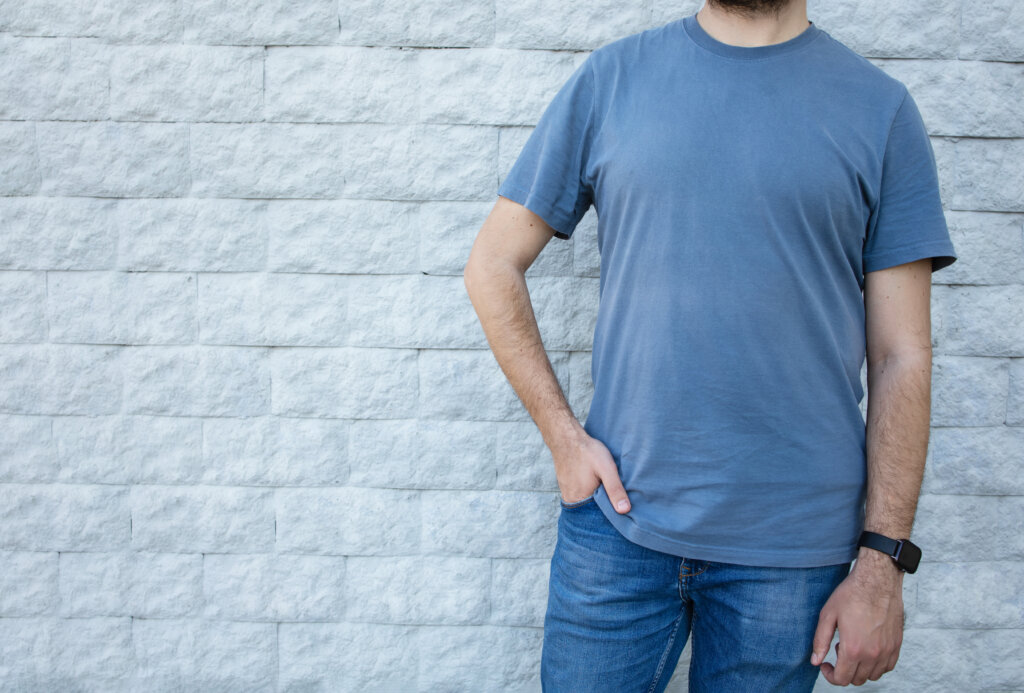
What standards need to be applied while choosing the best t-shirt fabric for your business? Here are a few of the most important things to consider:
Comfort
Most individuals find that cotton is the best fabric for tee shirts and more comfortable than polyester since it is breathable and soft. Blends of polyester and cotton and polyester may cause skin irritation for certain individuals.
Weight
There are differences in weight and thickness between polyester and cotton. Websites selling t-shirts typically indicate the thickness or thinness of the fabric.
Fit
Polyester keeps its original fit better than cotton because it doesn’t shrink as much. It can, however, also cling.
Longevity
Polyester wears out faster than cotton since it doesn’t absorb moisture and shrink. Varying degrees of durability are offered by different varieties of cotton. T-shirt cotton fabrics with more substance tend to last longer than those with less.
Cost
Regular cotton is less expensive than polyester. Blends of cotton and polyester can help lessen this. But premium cotton textiles may be pricey.
Climate Sustainability
Compared to polyester, cotton is more climate-friendly. Compared to other varieties of cotton, organic cotton is more sustainable.
Additional Considerations for B2B Buyers
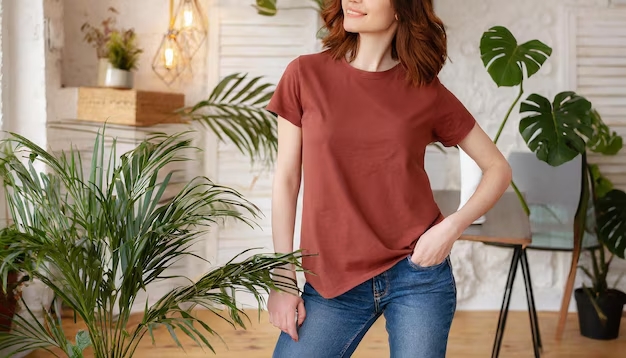
While fabric selection is crucial, B2B buyers have additional factors to consider when choosing a t-shirt manufacturers. Here are some key points:
Minimum Order Quantities (MOQs)
Manufacturers often have minimum order quantities, the lowest number of units they’ll produce per order. This is essential for B2B buyers to ensure they can meet their bulk needs efficiently.
Customization Options
Successful branding involves creating t-shirts that reflect your company’s image and target audience. Look for manufacturers with customization options like screen printing, embroidery, and custom labeling to achieve a unique brand identity.
Specialized Expertise
Some manufacturers excel in specific areas like cutting-edge printing techniques or eco-friendly fabrics such as bamboo. B2B buyers can benefit from a manufacturer’s specialized knowledge to stay ahead of trends and offer unique products.
Bringing Together The Strength in Blends!
Cotton or cotton blends are the best material for shirts when it comes to selecting the ideal t-shirt. These materials, which are renowned for their comfort and toughness, provide reliability for daily use. But keep in mind that, especially in warm areas, they might not feel as soft against the skin as silk or rayon. If longevity is important to you, 100% cotton is the best choice. However, blended fabrics are a great option if comfort is more important to you than durability—especially if you want to wear the shirt several times before washing it. Remember that the decision ultimately comes down to personal taste and intended use.
For quality and good material t shirts that meet your specific requirements, consider Tack Apparel, your trusted clothing manufacturer. Experience comfort, durability, and style with our range of carefully crafted t-shirts. Make your brand stand out with Tack Apparel today!

